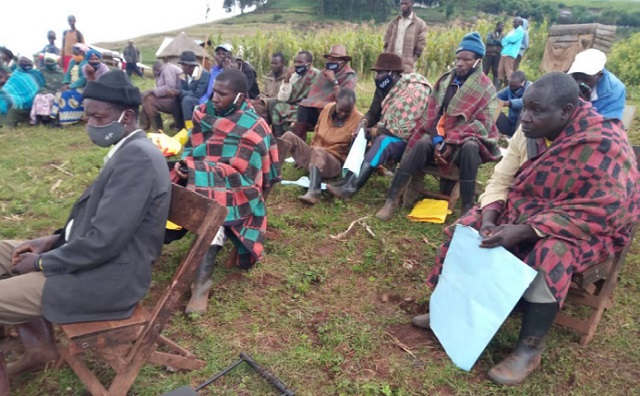
Uganda’s champions
The Benet people are equally marginalised. David Chemutai, the coordinator of the Mt. Elgon Benet Indigenous Ogiek Group (MEBIO), a community based organisation that is advancing the rights of the community says his people’s suffering started in 1983 when the government evicted them to set up the Mt. Elgon National Park. To this day, Chemutai says, the Benet live in temporary settlements on the edge of the game park.
Chemutai says it hurts him to see his community remains unrecognized despite it putting Uganda on the athletics map during global sports events like the Olympics. He mentions world champions Peruth Chemutai, Joshua Cheptegei, Joshua Kiplimo and Steven Kiprotich. These are actually from the Benet community and not the more dominant Sabiny group as is widely believed.
“Just like the rest of the community, they were forced to take on Sabiny identity because of identification and marginalisation and discrimination,” Chemutai told The Independent, “We are a stateless community and we are not included in the Constitution of Uganda as an ethnic group.”
The Benet are not recognised in the schedule of tribes in the Uganda Constitution.
The Maragoli question
Jane Dayo belongs to another minority group, the Maragoli, whose great-grand parents were resettled in Bunyoro from Kenya in 1958 by the British colonial government. Most Maragoli remain in Kenya and are a dominant segment of the Luhya; a major ethic group in that country. But the Maragoli in Uganda say that after living as a community in Uganda for over 50 years and without any connection to the Kenyan Maragoli anymore, they deserve to be officially recognised as a Ugandan ethnic group.
Dayo who is a member of the Maragoli Community Association says her community should be included in the schedule for Uganda’s ethnic groups in the Constitution. The Constitution only recognizes 56 ethnic groups who are said to have been living inside the territorial boundaries as of February 01, 1926.
Dayo says the Maragoli suffer because of being left out.
“We are not considered as citizens and natives of Uganda,” she says, “And because of this discrimination, the Maragoli find it hard to access government services such as education and health.”
In 2017, for example, when the government asked parents to enrol their children using national IDs, the Maragoli children came off worse since their parents had no IDs.
“Up to now, the Maragoli have not got the IDs. Those who have the IDs have gone through a lot of struggle. Some of the IDs were confiscated by NIRA because the officials say the Maragoli don’t appear anywhere in the Constitution as citizens of Uganda,” Dayo told The Independent.
“Our children have been denied their identity right from childhood. Their parents only got the IDs after seeking help from a neighbour who is a Munyoro or Mugisu so that child is registered under the national ID of the neighbour who is not the real parent.”
Dayo says her community faces the same challenges when it comes to access to health services. It is not only far but the health personnel want you to present the national ID.
“My mother, for instance, is diabetic and before she got a national ID, she used to suffer at the health facility. She reached a point of never going back to hospital and decided to resort to local herbs.”
Dayo lives in what she calls a ‘catchment’ in Kiryandongo District in mid-western Uganda where many of her community are settled. She says she is the only girl in her catchment who is educated. Nobody has ever completed a professional course.
“If a Maragoli child does not have a passion for education and her parents are not as committed, the child cannot go far to attain an education,” Dayo told The Independent.
“We have zero university graduates among the Maragoli,” she says and blames it on parents finding it difficult to send their young ones to school that are very far yet the roads are bad and bushy.
“For those who eventually begin when they are relatively mature; they soon begin comparing themselves to their peers from other communities. They then start thinking they are too old for the lower level primary classes and so they end up dropping out,” she says.
“In an estimated 100 Maragoli homesteads, you could find only 40% of people who have attained primary education and those who go on to finish S.4 could only be about 10% or less,” she says.
Dayo went to Kizibu Primary School in Kiryandongo but all her Maragoli peers she started out with dropped out except two. Dayo and her two colleagues then joined Kigumba Secondary School for her O-Level education. But her two colleagues eventually dropped out in Senior Two.
“I struggled and completed Senior Four. However, although, I actually passed with a First Grade, my parents could not sponsor my A-Level education because they could not afford to do so. I had no choice but to branch to the Primary Teachers College.”
This is where she qualified with a teaching certificate after two years. “I immediately got employed and I have since been upgrading my qualifications,” she says.
 The Independent Uganda: You get the Truth we Pay the Price
The Independent Uganda: You get the Truth we Pay the Price


